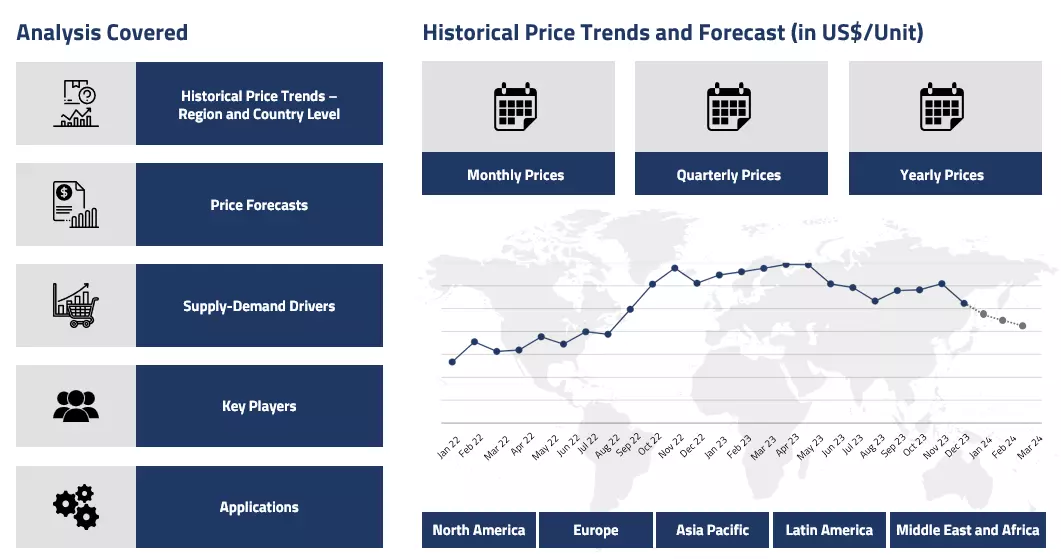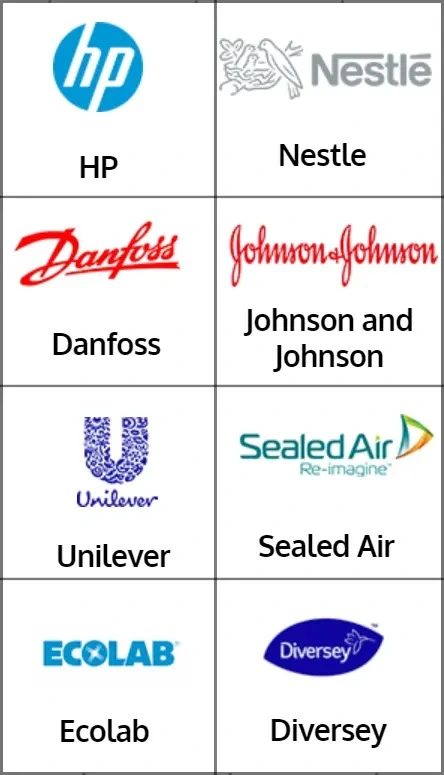Product
Lead Price Trend and Forecast
Lead Price Trend and Forecast
Lead Regional Price Overview
Get the latest insights on price movement and trend analysis of Lead in different regions across the world (Asia, Europe, North America, Latin America, and the Middle East & Africa).
Lead Price Trend for the First Half of 2025
| Product | Category | Region | Price | Time Period |
| Lead | Energy, Metals and Minerals | India | 2138 USD/MT | January 2025 |
| Lead | Energy, Metals and Minerals | India | 2145 USD/MT | June 2025 |
| Lead | Energy, Metals and Minerals | Europe | 1953 USD/MT | January 2025 |
| Lead | Energy, Metals and Minerals | Europe | 1999 USD/MT | June 2025 |
Stay updated with the latest Lead prices, historical data, and tailored regional analysis
Asia
In Asia, lead price curve displayed a relatively stable trajectory with range-bound fluctuations through the first half of 2025. The prices were about 2138 USD/MT in January and around 2145 USD/MT in June in the Indian markets. The movement was characterized by frequent short-term fluctuations within a narrow range, reflecting balanced conditions between supply availability and demand from the battery sector.
Lead Price Chart

Please Login or Subscribe to Access the Lead Price Chart Data
Compared to other regions, volatility was limited, and no prolonged upward or downward trend was observed during the period. Demand from China and India played a central role in supporting consumption, though increases in mine output across the region provided adequate supply. Market sentiment remained steady, with little evidence of speculative activity affecting the broader price path.
Europe
The European market followed a different path, with more pronounced oscillations over the same period. The prices were about 1953 USD/MT (Spot FD) in January and around 1999 USD/MT in June. Prices gradually strengthened from January through March, indicating moderate recovery in consumption and seasonal buying activity. In April, however, a sudden and sharp decline occurred, aligning with a broader downturn across scrap metal markets.
Reports confirmed that significant falls in copper, steel, and aluminum placed pressure on overall metal sentiment, which also spilled into the lead segment. After this dip, European lead prices recovered through May and June, stabilizing at higher levels relative to the first quarter. The overall picture suggests that European pricing was influenced both by local demand shifts in the automotive sector and by global scrap market volatility.
North America
In North America, lead pricing conditions in H1 2025 were shaped by renewed demand expectations. Following weaker consumption in 2024, usage began to rebound, supported by increasing activity in the battery industry. Price trends were steady, reflecting stronger buying interest and the region’s role in driving a partial recovery in global refined lead consumption.
Supply availability from local smelters and imports helped meet this rising demand without significant disruptions. While North American prices did not display the sudden dip seen in Europe, the market was nonetheless responsive to broader global movements, maintaining a firm undertone throughout the half year.
Analyst Insight
According to Procurement Resource, lead prices are expected to remain broadly stable in the near term, with minor fluctuations driven by supply adjustments and steady battery sector demand. A modest upward bias could emerge if consumption in automotive and energy storage strengthens further.
Lead Price Trend for the Second Half of 2024
Asia
In Asian markets, lead prices exhibited mixed trends during the second half of 2024. Initially, prices remained low due to subdued demand from downstream industries. This trend persisted until late September, after which prices began rising significantly. The primary driver behind this increase was heightened market activity towards the end of Q3, coupled with economic stimulus measures announced by the Chinese government, which boosted market confidence and attracted investments into the sector.
Meanwhile, in India, the Ministry of Labour and Employment issued a notification extending public utility service status for the Lead and Zinc Mining Industry for an additional six months, effective from November 9, 2024, to May 9, 2025. This extension ensured uninterrupted industry operations, preventing disruptions from strikes or industrial actions.
Europe
The European lead market mirrored pricing patterns observed in China, primarily influenced by regional macroeconomic conditions. Demand from major downstream sectors, including construction and automotive (batteries), remained weak, with new sales staying low in both industries. Although occasional demand upticks were recorded in certain months, the overall demand remained subdued. As a result, lead prices followed a fluctuating trajectory throughout H2'24.
North America
In North America, lead prices fluctuated throughout H2'24, aligning with trends observed in other global markets. At the beginning of the period, prices faced downward pressure due to a slowdown in the broader metals market. Additionally, trade activities remained cautious, with purchases made only on an as-needed basis. However, following the much-anticipated U.S. Federal Reserve rate cuts, the market showed signs of recovery. Overall, lead prices demonstrated varied trends throughout the second half of 2024.
Analyst Insight
According to Procurement Resource, the prices of lead are expected to show a fluctuating trajectory in the upcoming months, influenced by the macroeconomic and geopolitical conditions and broader dynamics of the metal market.
Lead Price Trend for the First Half of 2024
Asia
In China, lead prices experienced an upward trend in the first half of 2024. This increase was primarily driven by a significant decline in the supply of lead, with reduced domestic production from both primary and secondary sources. Imports of lead concentrates into China also fell sharply, leading to tighter market conditions.
Additionally, the lower availability of refined lead metal in the domestic market and a substantial decline in net exports contributed to the heightened prices. Meanwhile, the rest of Asia saw mixed trends. While countries like Japan and South Korea showed increased usage of refined lead metal, other regions, such as Thailand, experienced lower demand, creating a varied market dynamic across the continent.
Europe
The European market witnessed a downward pressure on lead prices during H1 2024, mainly due to reduced consumption of refined lead metal in key countries. Usage in Europe fell, primarily influenced by lower demand in the automotive and battery sectors. Despite increases in production in countries like Bulgaria and Italy, these were not enough to offset the overall reduction in demand. Additionally, disruptions in supply chains and economic uncertainties contributed to the subdued pricing environment for lead across the region.
North America
The lead market reflected a mixed picture, with supply increases in some regions balanced by declines in others. The modest rise in world lead mine production was insufficient to counterbalance the overall dip in refined lead usage, leading to varied regional trends in price dynamics during H1 2024. In North America, lead prices followed a similar downward trajectory. The market was affected by reduced usage of refined lead metal, particularly in the United States. The slowing demand in key sectors, such as automotive batteries, added to the downward price pressure. However, some resilience was observed in Mexico, where there was a slight increase in demand year-on-year, providing some support to prices but not enough to change the overall trend.
Analyst Insight
According to Procurement Resource, the price of Lead is expected to witness a declining momentum in the next quarters, with rising skepticism of the downstream battery industries over its usage in the sector and the influx of excessive supply of the commodity in the market.
Lead Price Trend for the Second Half of 2023
Asia
In Asian countries, the price trend of lead registered a significant improvement as compared to previous quarters. The surge in market prices during the initial phase of H2 of 2023 was based on the rise in demand from the downstream lead battery industries and the automotive sector.
Another factor that favored this rise in the prices was the limited availability of the material in the Asian markets and the reduction in the number of overseas shipments reaching the Asian ports due to the disruption of the Red Sea route. However, the momentum of the market slowed down slightly in the fourth quarter as the manufacturers enhanced their production rates in accordance with the projected demand for lead, but still, the demand overpowered the supply rates and kept the prices of lead moving forward.
Europe
The lead market of European countries seemed to bear the consequences of the ongoing geopolitical tensions stemming from the feet of the Russia-Ukraine and Israel-Hamas crises. This led to a limited influx of raw materials required for the smooth functioning of downstream industries and even the trading activities of the region. The upturn in the market activities thus caused the inventories to shoot up, keeping the prices on the lower end of the spectrum.
Analyst Insight
According to Procurement Resource, the price trend of Lead is estimated to follow an oscillating trend in the upcoming quarters as the global demand for lead seems to be fluctuating.
Lead Price Trend for the First Half of 2023
| Product | Category | Region | Price | Time Period |
| Lead | Energy, Metals and Minerals | India | 2345 USD/MT | Jan'2023 |
| Lead | Energy, Metals and Minerals | India | 2298 USD/MT | June'2023 |
| Lead | Energy, Metals and Minerals | Europe | 2188 USD/MT | Jan'2023 |
| Lead | Energy, Metals and Minerals | Europe | 2086 USD/MT | June'2023 |
Stay updated with the latest Lead prices, historical data, and tailored regional analysis
Asia
Lead prices fluctuated in the first half of the year 2023 in the Asian markets, especially the Indian market. The first quarter was more or less stable as the prices dipped and rose back within an extremely narrow margin. However, the second quarter witnessed a marginal fall. With an overall approximate 2% depreciation, the average monthly prices in India went from about 2345 USD/MT in January’23 to around 2298 USD/MT in June’23 in the Indian domestic market.
These market trend suggest moderate industrial activity along with a healthy supply and demand balance. Since the trade sentiments have been pivoting to India to fulfill the global supply gaps, trading activities have been rising in the lucrative consumer market.
Europe
Mimicking the Asian market, the lead price trend oscillated within a limited range in the European market as well. The trade consequences of the Russia and Ukraine conflict were steadily subsiding. Supply chains were being restored, and manufacturing activities were also warming up slowly. However, the pace of recovery was still in question since the end consumer demands were still struggling.
A long run of inflation had worn out the purchasing capacities. After some upward jumps in the first quarter, the lead prices decelerated by approximately 4% and went down from the monthly spot average of around 2188 USD/MT in January’23 to about 2086 USD/MT in June’23. Overall, mixed market sentiments were observed.
Analyst Insight
According to Procurement Resource, improvement is expected in the lead market trend going forward since the struggling market will seek normalization.
Lead Price Trend For the Second, Third and Fourth Quarters of 2022
Lead is a soft, grey, and malleable metal located in the carbon group of the periodic table. The fundamental usage of lead comes in making batteries. Other sectors like cable, machinery, manufacturing, ship making, radiation, testing, etc., also aid the lead market demands. During the said period of 2022, the lead prices fluctuated continuously in the global markets.
The second quarter was a little firm since the lockdown was revoked in China, and the demands saw a marginal rise. However, the third quarter again saw a decline in prices as the recovery was slow and industrial consumption was still uncertain. The lead prices almost plateaued by the time the fourth quarter arrived. The demands were driving these narrow-ranged price fluctuations in the lead market.
Analyst Insight
According to Procurement Resource, given the slow pace of global industrial development, not much improvement is anticipated in the global lead market.
Lead Price Trend For the First Quarter of 2022
Asia
Domestic lead prices fell after the Chinese New Year holidays, dragged down by falling LME lead, and spot lead prices fell below 15,000 RMB/MT to 14,800 RMB/MT. Later, prices recovered due to the cost support of secondary lead, and they rose at the end of the month as a result of the geopolitical conflict between Russia and Ukraine.
The Russia-Ukraine war tightened energy supply, and higher raw material costs due to the VAT on lead-acid battery scrap kept lead prices rising into March. The price of base metals rose across the board amid strong bullish sentiment, with nickel leading the way.On March 8, the LME and most-traded SHFE lead contract both reached highs of 2,700 USD/MT and 16,465 RMB/MT, respectively. After the LME and SHFE tightened regulations to stem the irrational price surge, base metals prices fell and were once again dominated by fundamentals.
Lead Price Trend For the Fourth Quarter of 2021
Asia
In Q4 2021, Chinese ingot average prices were recorded at 2350 USD/MT. As stockpiles declined, refined lead prices jumped almost 4% in the final week of December, but lead prices had already achieved their peak. Several smelters of this metal were executing maintenance operations, resulting in smaller ingot inventories. As a result, prices increased, but now that secondary smelters are resuming operations, lead prices may be under pressure.
Europe
In the final quarter, average lead prices were recorded at 2255 USD/MT. Metals production was hampered by a lack of electricity and exorbitant costs in Europe, which drove up LME prices of the metal and compensated for losses during the Chinese New Year break. For a week, Europe's power supply was short, while LME lead supplies remained stable, despite China's planned lead ingot exports to Europe. The LME price stayed unchanged at 2,300 USD/MT.
North America
China's rapid expansion in inventories was spurred by aggressive secondary lead capacity development and significant tolling activity at Chinese smelters. The Shanghai Futures Exchange's warehouse stockpiles hit new highs this year, reaching 200,000 MT. Increased price fluctuation and smelter outages generated shortages abroad, but high shipping charges and container constraints kept the surplus in China.
Physical premiums in the US reached multi-year highs, while supplies in the LME warehouse network reaching 12-year lows. According to the worldwide supply-demand model, the refined lead market dynamics will gradually rebalance during 2022, following the minor surplus that developed in China this year.
Lead Price Trend For First, Second and Third Quarters of 2021
Asia
In the first half of 2021, the average price of ingot was 2360 USD/MT in China. The country shipped 15,545 metric tonnes of refined lead in September, the greatest volume (shipment) since 2007. Inventories reached a new high in 2018, placing a lot of strain on the supply side.
However, as delivery sources dried up and demand slowed during the off-season, stockpiles of final products at battery manufacturers continued to build in 2021. Users further downstream made low-cost purchases. Primary smelters of this metal benefited the most from byproducts as the TCs continued to fall. Although Jinli was being serviced, the production remained unaltered.
Europe
The market price for the first half of the year was recorded at 2200 USD/MT. An increase in usage was witnessed in Europe. Lead prices had grown by more than 7% on the international market since the beginning of the year, but they had fallen by the end of the year as supplies improved. In the second half of 2021, increased recycling of vehicle batteries boosted secondary lead production or recycling.
North America
Despite the fact that the United States contributes for only 13% of global demand, the end of COVID-19 lockdowns increased the metal’s consumption as motorists sought replacements for lead-acid batteries that had died after extended periods of inactivity. The metal’s pricing forecast for the year was increased to 2,200 USD/MT from 2,125 USD/MT, citing the average price of 2,316 USD/MT in November and December. Rising vehicle prices began to have an impact on worldwide automobile manufacturing during the next several months, stopping the rise in consumption.
Lead Price Trend For the Year 2020
Asia
In 2020, average lead ingot prices were recorded at 2135 USD/MT in China. Because of increased output in the automobile sector, which pushed demand for new batteries, domestic lead scrap and ingot prices in India climbed by 1-3% in August 2020. A 3% increase in formal three-month LME prices to 1,981 USD/MT also helped strengthen domestic pricing.
The smelters in Mumbai and Delhi increased output to meet surging demand from the automobile industry. Automakers predicted pent-up demand over India's upcoming Christmas season. With more demand on the horizon, smelters raised bids steadily, resulting in a price increase of 3,000-4,000 INR/MT in cities like as Mumbai and Delhi. Since mid-July, the price of re-melted and purified lead had been rising, placing ingot makers in a good position.
Europe
In 2020, average lead prices were 1860 USD/MT in Europe. The metal had been missed previously and was now slipping behind. On the other hand, the pace and strength of the metal’s rally had been fairly unexpected. Berzelius Stolberg, Europe's largest primary lead smelter, declared in December 2020 that metal supply from its facilities in western Germany would be halted due to force majeure.
North America
The US market tightened after Doe Run closed its smelter in Herculaneum, Missouri, in 2013 and Glencore closed its Brunswick smelter in Canada in late 2019. During and after the Covid-19 epidemic, labour shortages, general material scarcity, transportation limits, and the high cost of freight overseas worsened the tension. As a result of these reasons, premiums remained high.
The increase in the price came at a time when the lead and battery supply chain was struggling to refill automotive lead battery inventories in various parts of the world. Despite new environmental regulations, the use of refined lead in the global automotive industry has continued to grow in the United States.
Procurement Resource provides latest prices of Lead. Each price database is tied to a user-friendly graphing tool dating back to 2014, which provides a range of functionalities: configuration of price series over user defined time period; comparison of product movements across countries; customisation of price currencies and unit; extraction of price data as excel files to be used offline.
About Lead
In appearance, Lead is a metallic gray element which has many different applications. Being soft and malleable, it has low melting point. It is widely utilised in the production of batteries, fusible alloys, ammunition, metal products (solder and pipes), as well as in the devices to shield X-rays.
Lead Product Details
| Report Features | Details |
| Product Name | Lead |
| Chemical Formula | Pb |
| Industrial Uses | Batteries, Cable sheaths, Machinery manufacturing, ShipbuildingLight industry, Lead oxide, Radiation protection |
| Molecular Weight | 207.2 g/mol |
| Synonyms | 7439-92-1, Plumbum |
| Supplier Database | Umicore N.V, American Elements, Glencore plc, Korea Zinc Co., Ltd., The Doe Run Resources Corporation, Hindustan Zinc Limited |
| Region/Countries Covered | Asia Pacific: China, India, Indonesia, Pakistan, Bangladesh, Japan, Philippines, Vietnam, Iran, Thailand, South Korea, Iraq, Saudi Arabia, Malaysia, Nepal, Taiwan, Sri Lanka, UAE, Israel, Hongkong, Singapore, Oman, Kuwait, Qatar, Australia, and New Zealand Europe: Germany, France, United Kingdom, Italy, Spain, Russia, Turkey, Netherlands, Poland, Sweden, Belgium, Austria, Ireland Switzerland, Norway, Denmark, Romania, Finland, Czech Republic, Portugal and Greece North America: United States and Canada Latin America: Brazil, Mexico, Argentina, Columbia, Chile, Ecuador, and Peru Africa: South Africa, Nigeria, Egypt, Algeria, Morocco |
| Currency | US$ (Data can also be provided in local currency) |
| Supplier Database Availability | Yes |
| Customization Scope | The report can be customized as per the requirements of the customer |
| Post-Sale Analyst Support | 360-degree analyst support after report delivery |
Note: Our supplier search experts can assist your procurement teams in compiling and validating a list of suppliers indicating they have products, services, and capabilities that meet your company's needs.
Lead Production Process
- Production of Lead via Sintering.
The primary production of lead begins with the Sintering process, where concentrated lead ore is processed inside a sintering machine along with iron, silica, limestone fluxes, soda ash, pyrite, zinc, caustics or pollution control particulates. Smelting uitlises reduction substances, which are known for combining with the oxidising agents. Hence, reduction is the last step in this smelting process, which further produces elemental Lead.
Methodology
The displayed pricing data is derived through weighted average purchase price, including contract and spot transactions at the specified locations unless otherwise stated. The information provided comes from the compilation and processing of commercial data officially reported for each nation (i.e. government agencies, external trade bodies, and industry publications).
Assistance from Experts
Procurement Resource is a one-stop solution for businesses aiming at the best industry insights and market evaluation in the arena of procurement. Our team of market leaders covers all the facets of procurement strategies with its holistic industry reports, extensive production cost and pre-feasibility insights, and price trends dynamics impacting the cost trajectories of the plethora of products encompassing various industries. With the best analysis of the market trends and comprehensive consulting in light of the best strategic footstep, Procurement Resource got all that it takes.
Client's Satisfaction
Procurement Resource has made a mark for itself in terms of its rigorous assistance to its clientele. Our experienced panel of experts leave no stone unturned in ensuring the expertise at every step of our clients' strategic procurement journey. Our prompt assistance, prudential analysis, and pragmatic tactics considering the best procurement move for industries are all that sets us apart. We at Procurement Resource value our clients, which our clients vouch for.
Assured Quality
Expertise, judiciousness, and expedience are the crucial aspects of our modus operandi at Procurement Resource. Quality is non-negotiable, and we don't compromise on that. Our best-in-class solutions, elaborative consulting substantiated by exhaustive evaluation, and fool-proof reports have led us to come this far, making us the ‘numero uno' in the domain of procurement. Be it exclusive qualitative research or assiduous quantitative research methodologies, our high quality of work is what our clients swear by.
Table Of Contents
Our Clients

Get in Touch With Us

UNITED STATES
Phone:+1 307 363 1045

INDIA
Phone: +91 8850629517

UNITED KINGDOM
Phone: +44 7537 171117
Email: sales@procurementresource.com

